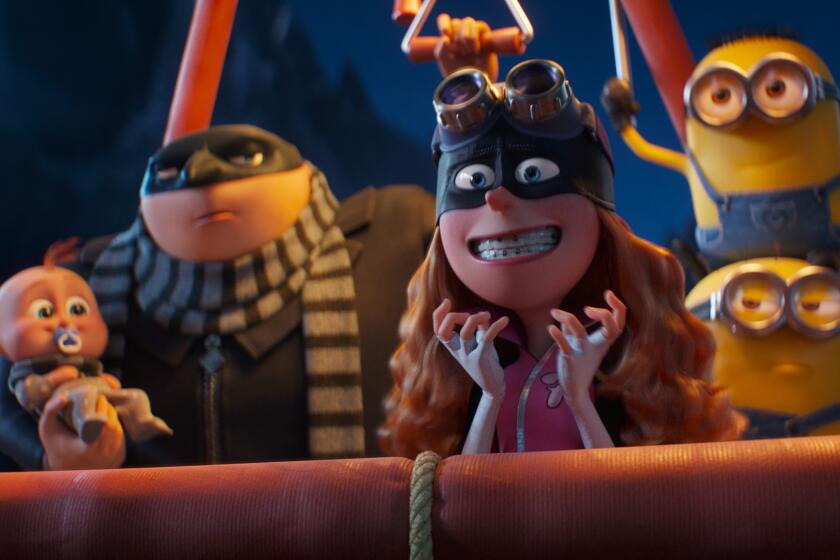
Scary. Terrifying. Deeply misguided.
This week, actors and filmmakers like Emily Blunt, Whoopi Goldberg, and Natasha Lyonne were among those with strong emotional responses to the unexpected rise to fame of Tilly Norwood.
Norwood isn’t a real person – the brunette seen in the comedy sketches on her Instagram is actually a digitally created character, a computer-generated composite.

Hollywood Inc.
Hatsune Miku has been selling out concerts, and she’s preparing for her largest performance yet at Coachella. Though she appears as a teenager, she isn’t a real person. She’s one of many digital characters – including Miquela and angelbaby – who are now making music for their fans.
A post on Norwood’s Instagram says, “I may be AI, but I’m experiencing genuinely strong feelings right now.” The message continues, “I am so excited for what’s coming next!”
This feeling wasn’t common, particularly in Hollywood. There, people are deeply worried that AI might take over actors’ jobs – both by being used responsibly and irresponsibly. Concerns about this are widespread.
The creator of Norwood caused quite a stir when she revealed that the digital actress would soon be represented by a talent agency.
This week, SAG-AFTRA issued a strong and critical reply. Two years prior, the union’s members went on strike for 118 days to secure better AI protections in their agreements with the major studios.
“To be clear, ‘Tilly Norwood’ is not an actor, it’s a character generated by a computer program that was trained on the work of countless professional performers — without permission or compensation,” the guild said. “It doesn’t solve any ‘problem’— it creates the problem of using stolen performances to put actors out of work, jeopardizing performer livelihoods and devaluing human artistry.”
Norwood was brought to life using artificial intelligence by Xicoia, an AI talent studio based in London and founded by Dutch actor Eline Van Der Velden. According to Deadline, which was the first to report on this, Xicoia is collaborating with the representatives of actors and Hollywood stars who are interested in portraying their younger selves on screen.
We were unable to reach Van Der Velden, the founder of AI production company Particle6, for comment on Wednesday.
However, in a statement shared on Instagram after the criticism, Van der Velden emphasized that Norwood is “a creative work – a piece of art.”
Van der Velden explained that he views AI not as something that will replace humans, but as a helpful new tool – like a new paintbrush. He drew a parallel to animation, puppetry, and CGI, noting that these technologies created new opportunities without diminishing the importance of live performance. Similarly, AI provides another way to develop and construct narratives, offering fresh possibilities for storytelling. He said, “Just as animation, puppetry, or CGI opened fresh possibilities without taking away from live acting, AI offers another way to imagine and build stories.” You can learn more about AI tools here.

Hollywood Inc.
Next year will see the release of ‘Critterz,’ an AI-animated film made possible by the technology from OpenAI. OpenAI is supplying the technical tools needed to create the film.
SAG-AFTRA President Sean Astin disputed the claim.
In an interview with the Times, he stated that the content used to develop Tilly Norwood was “improperly obtained” from the work of SAG-AFTRA members. This happened without their permission, any compensation, or proper acknowledgment.
According to Astin, the idea that this doesn’t hurt artists-because it’s presented as something completely original-misses the point. It’s still using work that doesn’t rightfully belong to them.”
We aim to help our members take advantage of the latest technologies… However, they must consent to it, and we need to negotiate with them to make it happen.
With 44,000 followers on Instagram, Norwood is presented as a young, London-based actor who’s just starting out. He seems to enjoy the simple things in life, like shopping and drinking iced coffee. He is an aspiring actor.
The social media page shows Norwood in a variety of settings. We see her prepared to fight a monster in one scene, and fleeing from a crumbling building in a futuristic city in another.
At an industry panel in Zurich on Saturday, Van Der Velden touted her creation.
Van Der Velden explained that when they initially launched Tilly, many people doubted it would succeed. “People were like, ‘That’s not going to happen,’” he said. However, they are now preparing to announce which agency will be representing her in the coming months. He added that the situation is improving, and people are finally beginning to understand the potential. “It’s all changing and everyone is starting to see the light, fortunately.”

Business
With brands increasingly trying out AI and digital clones, people working in fashion are facing the challenge of remaining valuable in an industry that’s already highly competitive. They’re trying to figure out how to stay relevant as technology changes the landscape.
Talent agencies now represent computer-generated characters for advertising. It’s becoming more and more normal to see these avatars in popular culture – for example, in 2024, the Japanese digital character Hatsune Miku performed at Coachella, and an AI model appeared in the August issue of Vogue magazine, promoting the L.A. brand Guess.
Several studios, such as Lionsgate, are collaborating with AI companies to investigate how the technology can help with things like creating storyboards. Meanwhile, companies like Netflix and Amazon MGM Studios are already using AI in their shows for visual effects.
Technology companies contend they should have the right to use online content to train their AI models and provide helpful responses, citing the “fair use” doctrine. This legal principle permits limited use of copyrighted material without needing permission from the copyright owner.
However, the rapid growth of AI has also raised worries that AI firms are training their systems using copyrighted content without getting permission or paying for it. Just recently, Disney, Universal and Warner Bros. Discovery filed a lawsuit against AI companies, claiming copyright violations.

Hollywood Inc.
As a movie lover, I’m following this closely: Disney, Universal, and Warner Bros. Discovery are actually suing a Chinese AI company called MiniMax. It’s all about copyright infringement – basically, they claim MiniMax is using their movies to train its AI without permission. This is the second lawsuit big studios have filed, and it shows how seriously the entertainment industry is taking the rise of these AI tools. It’s a big deal, and I’m curious to see how it all plays out!
Several actors are urging a boycott of agents who choose to work with Norwood. “Read the room, how gross,” wrote Melissa Barrera, an actor from “In the Heights”, on Instagram.
According to Astin, our members have the right to discontinue business relationships with representatives exhibiting an unfair conflict of interest or acting in bad faith. “Our members reserve the right to not be in business with representatives who are operating in an unfair conflict of interest, who are operating in bad faith,” Astin said.
Read More
- Mobile Legends: Bang Bang (MLBB) Sora Guide: Best Build, Emblem and Gameplay Tips
- Clash Royale Best Boss Bandit Champion decks
- Best Hero Card Decks in Clash Royale
- All Brawl Stars Brawliday Rewards For 2025
- Best Arena 9 Decks in Clast Royale
- Vampire’s Fall 2 redeem codes and how to use them (June 2025)
- Clash Royale Witch Evolution best decks guide
- Brawl Stars December 2025 Brawl Talk: Two New Brawlers, Buffie, Vault, New Skins, Game Modes, and more
- Clash Royale Furnace Evolution best decks guide
- Dawn Watch: Survival gift codes and how to use them (October 2025)
2025-10-02 19:32